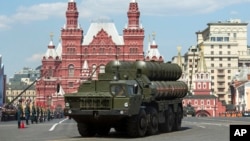The Pentagon is warning of "grave consequences" to military relations between the United States and Turkey should Ankara purchase a Russian surface-to-air missile system.
"If Turkey takes the S-400, there would be grave consequences in terms of our relationship, military relationship with them," chief Pentagon spokesman Charlie Summers told reporters Friday.
Summers said those consequences would encompass losing U.S. military sales to Turkey, including the long-awaited sale of the United States' new F-35 Joint Strike Fighter jet.
"If they take the S-400s then … they would not get the F-35s and the Patriots," Summers said, referring to the Patriot surface-to-air missile system, which has a primary function of defending against ballistic missiles and has been presented as an American-made alternative to the S-400.
Ankara signed an agreement with Moscow for the S-400 missile system in 2017. At the same time, Turkey has helped finance the F-35 program and planned to buy 100 of the jets from the U.S., the first of which are due to be delivered later this year.
Washington fears the sophisticated radar of the S-400 system could compromise the F-35 technology, which was developed to elude Russian-made systems. Ankara insists the S-400 offers the best value for its needs and poses no threat to NATO systems.
Earlier this week, the head of U.S. European Command told lawmakers the United States should not move forward with the F-35 sales, should Turkey purchase the S-400.
"My best military advice would be that we don't then follow through with the F-35, flying it or working with allies that are working with Russian systems, particularly air defense systems," Army Gen. Curtis Scaparrotti said Tuesday.
A day later, Turkish President Recep Tayyip Erdogan reiterated his commitment to buy the Russian missile system and suggested expanding the purchase to Russia's more advanced S-500 system.
Ankara is slated to receive the S-400 later this year in hopes of making the system ready for use by 2020.
Dorian Jones contributed to this report from Istanbul







